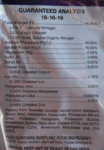just.wing.it
Deadwood Head
In honor of my new friend @Bananaman, who made a salient point yesterday regarding fertilizer, I wanted to bring the question to the rest of the Nutters.
Here it is in a (B)Nutshell, is there any good reason or benefit to switching up your fertilizer periodically?
NPK is NPK, right???
So why would one choose to use Blue Juice one week and Chocolate Fish Milk the next?
The useable nutrients are still the same 3 chemicals, right???
My only thought besides what Bananaman said, about giving the owner a warm fuzzy feeling inside was, MICRONUTRIENTS in the natural fish product could differ from those in chemical ferts...and may be beneficial.
I don't consider it a waste of money, because if you're using it all, then you're using it all...by switching back and forth, you double the length of time it takes to use all of either....its not wasting, unless you're truly wasting it.
I know I might not like eating the same thing for every meal, but do my trees give a damn?
Thoughts please...
Thanks!
Here it is in a (B)Nutshell, is there any good reason or benefit to switching up your fertilizer periodically?
NPK is NPK, right???
So why would one choose to use Blue Juice one week and Chocolate Fish Milk the next?
The useable nutrients are still the same 3 chemicals, right???
My only thought besides what Bananaman said, about giving the owner a warm fuzzy feeling inside was, MICRONUTRIENTS in the natural fish product could differ from those in chemical ferts...and may be beneficial.
I don't consider it a waste of money, because if you're using it all, then you're using it all...by switching back and forth, you double the length of time it takes to use all of either....its not wasting, unless you're truly wasting it.
I know I might not like eating the same thing for every meal, but do my trees give a damn?
Thoughts please...
Thanks!

